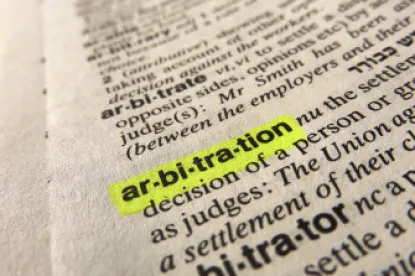A recent federal court decision from the District of New Jersey highlights the uncertainty over the extent that a court can review an appraisal made pursuant to a contract dispute resolution provision. Adler Engineers, Inc. v. Dranoff Properties, Inc., (July 5, 2016). In Adler, Judge Robert B. Kugler held that, although New Jersey law was not settled on the issue, the court could review an appraiser’s determination “when the appraiser has made a mistake of law or when the appraiser has misapprehended the facts or issues presented.” Ordinarily, the New Jersey courts will only review an arbitrator’s decision when there are claims of bias, fraud or similar wrongdoing by the arbitrator. Adler holds that, when the parties contract to have an appraiser resolve any dispute over value, the New Jersey courts may exercise a broader scope of review than would apply when an arbitrator determines the issues.
The parties in Adler had contracted to determine the fair price for the sale of a property on Market Street in Camden. The contract embodied a common mechanism to determine value: each party would select an MAI certified appraiser to conduct an appraisal and, if their appraisals differed by more than 10 percent, those two appraisers would choose a third MAI-certified appraiser to provide a third appraisal. If any of the three appraisals differed from the other two by more than 15 percent, the outlier would be discarded and the average of the remaining two appraisals would be the purchase price. The purchase price would then be confirmed by written notice from the defendant to the plaintiffs and an escrow agent within five days. The contract did not provide that the appraisal determination would be final and binding on the parties, or state in what circumstances the appraisers’ determinations could be challenged or reviewed.
The plaintiffs’ appraiser, Eugene Pasymowski, determined a value of $1,820,000 and the defendant’s appraiser, John Lynch, valued the property at $925,000. Because the difference in values was greater than 10 percent, a third appraiser had to be selected. After some delay, the two appraisers settled on Lee Romm to act as the third appraiser. Romm appraised the property at $1,275,000. Because all three appraisals differed by more than 15 percent, the two closest appraisals (Lynch and Romm) were averaged together, resulting in a value of $1,100,000, and the plaintiffs’ appraisal (Pasymowski) was discarded. Defendant confirmed the result by email to the plaintiffs, and the following day plaintiffs’ attorney confirmed the purchase price.
Plaintiffs later had multiple communications with their appraiser about revising his valuation, including asking Pasymowski “to look at your work and IF it would reduce your appraisal to $1,600,000 then yours would be in play and not Lynch’s.” Plaintiffs’ attorney also wrote to defendants retracting his earlier agreement on the purchase price and identifying several facts that he believed that Romm had not considered in his appraisal, including a $1,500,000 offer, a comparable sale, and the existing lease on the property. Plaintiffs’ counsel conveyed these issues to Romm and urged him to consider revising his report or explain why he had not taken these facts into account. The next day, defendant terminated the contract on the grounds that plaintiffs’ demand to have Romm revise his report was a material breach of the contract. Romm later did supplement his report, advising that the additional facts proposed by plaintiffs did not warrant adjustment of the value but that he had discovered a mathematical error that increased the value by $10,000. At some point, Pasymowski also revised his valuation opinion to lower the value from $1,820,000 to $1,500,000. Plaintiffs offered to sell the property at $1,392,000 (the average of the Romm and Pasymowski appraisals) but defendants rejected that offer. Plaintiffs then commenced a lawsuit, claiming that defendant’s unilateral termination was a breach of the contract. Both parties sought summary judgment.
The district court denied summary judgment. First, it rejected the defendant’s argument that the appraisers’ determinations could not be reviewed because the contract was silent about whether the parties could contest the appraisers’ determinations. The district court noted New Jersey intermediate appellate court decisions were inconsistent on the issue. Two Appellate Division decisions seemed to hold that an appraiser’s determination could only be reviewed under the same narrow standards as an arbitration award, essentially only for corruption, bias or similar wrongdoing. See Cap City Products Co. v Louriero, 753 A.2d 1205 (App. Div. 2000) and Cablevision of Oakland v. CK Bergen Holdings, 2014 WL 923226 (App. Div. Mar. 11, 2014). However, another Appellate Division decision recognized that parties to a contract did not surrender all rights to inquire into an appraiser’s methods simply because the contract was silent on their ability to do so. Leach v. Princeton Surgiplex, LLC, 2014 WL 2436045 (App. Div. June 6, 2013). The court reasoned, following Leach, that a party could not challenge an appraiser who relied on improper methods or considered loss than all relevant evidence or who had committed mathematical errors.
It cannot be seriously argued that the parties were required to accept the appraisers’ valuations no matter how deficient. Although it is quite possible that Plaintiffs would have been in breach of the Agreement had they continued to refuse the purchase price after Romm explained that Plaintiffs’ objections did not affect his valuation, Defendant did not give them an opportunity prior to terminating the Agreement on its own. As such, the Court finds that Plaintiff’s conduct did not violate the express provisions of the Contract . . .2016 WL528160 *6.
The court reasoned that the plaintiffs had not said they would not accept the third appraiser’s conclusion of value but only requested that Romm consider their additional information or explain why he did not take those facts into consideration. The contract did not forbid that or provide that the appraiser’s determination would be final and binding in setting the purchase price. Had the agreement been more specific on those points, the Adler decision might have been different. Judge Kugler noted that the contract between the parties in Cablevision expressly provided that “the third appraiser’s decision ‘shall be final.’”
The court went on to note that there were material issues of fact that precluded summary judgment in favor of plaintiffs, including the multiple communications with their appraiser Pasymowski before defendant’s termination from which a jury could find that plaintiffs were improperly attempting to influence the appraisal process with the intent to deprive the defendant of the benefits of the contract.
The lesson of Adler is that judicial review under New Jersey law may be different depending on whether the dispute resolution mechanism is through an appraiser or an arbitrator. If the parties agree upon an appraiser, the dispute resolution provision should be carefully drafted to specify the grounds for judicial review of the appraiser’s determination. Parties can expressly provide for a comment period following the issuance of the appraiser’s report within which they can raise any issues they believe the appraiser should consider or has failed to consider. They can also provide that, after reviewing comments, the appraiser’s determination will be final and binding or can provide for review under some limited circumstances.




 />i
/>i

